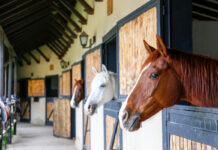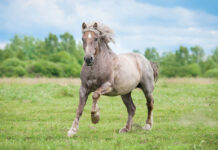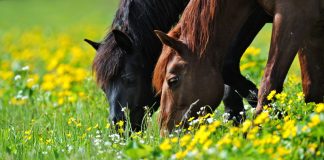 Q: I have a 29-year-old Appaloosa that is missing some teeth. She drools a lot and likes to throw her feed on the mat below her feeder making quite a mess. I tried soaking her feed but then she wouldn’t eat it at all. She can’t eat grass or hay though she tries. What can I feed her, and is there anything I can do to prevent her from dropping so much feed?
Q: I have a 29-year-old Appaloosa that is missing some teeth. She drools a lot and likes to throw her feed on the mat below her feeder making quite a mess. I tried soaking her feed but then she wouldn’t eat it at all. She can’t eat grass or hay though she tries. What can I feed her, and is there anything I can do to prevent her from dropping so much feed?
The dropping of feed, or quidding, is a common sign of dental problems in the horse and is seen often in older horses. The key to proper nutrition in the older horse revolves around offering feed that can be easily eaten, easily digested, and is high in nutrients. Many older horses with dental problems similar to your mare have trouble eating forage such as hay because it is thin and stalky. Some alternatives to hay include alfalfa cubes or pellets but be warned: make sure the horse has access to plenty of water when given this type of feed as it is dehydrated and therefore quite dry, sometimes predisposing a horse to choke. Another suggestion for your mare is to instead become more selective with your hay and opt for second- or third-cutting alfalfa or mixed hay that is soft and leafy.
As far as grain, there are numerous complete feeds on the market labeled for the senior horse. A “complete feed” means this diet is properly balanced and contains all the nutrients your horse needs. Most senior feeds are high in easily digestible energy to help maintain weight and are high in fiber for proper gut health.
Nothing much can be done about fixing your mare’s habit of quidding, as this is a mechanical result of missing teeth. Consider feeding your mare separately from other horses so she is not rushed to finish her meal. Moistening her feed is a good suggestion to make sure the feed is soft, although if your mare will not eat soggy feed, then just make such she always has access to fresh clean water. You can also try adding a small amount of vegetable oil to her feed. This will not only soften it, but also add a little extra fat to her diet. Adding a small amount of molasses to the feed is another way to hide the fact that it is slightly moistened.
Scheduling routine dental care at least once a year if not biannually is the best thing you can do for your mare. Your veterinarian can file off any sharp points and correct (up to a point) uneven wear that are sure to be created by her elderly smile.
Ask your horse health questions on the horseillustrated.com Forums >>
See more Expert Q&As >>
Submit your Ask the Expert question >>






i would also try beet pulp because of it’s high fiber and fat content, good luck with your old girl
Thanks for the information
Thanks for the information
thanks for the info
we have a 32 year old gelding with no back teeth so we buy pellets and senior feed, dampen it until it is soft, it took a couple of days for hime to get used to it but now he loves his mush. copied this from having to soften the puppy food when we started to wean the puppies.
How often do a horse’s teeth need to be floated